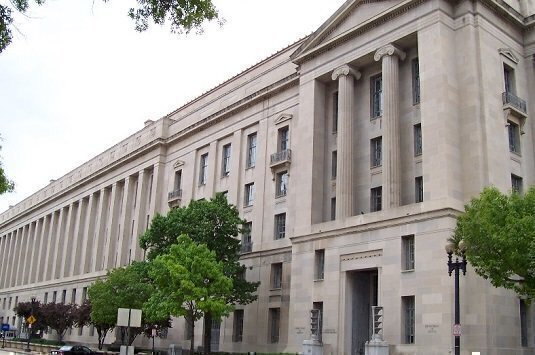This week, an obscure act of Congress is getting a lot of attention in the discussion over Rod Rosenstein’s future in Washington. What is the Federal Vacancies Reform Act of 1998 and why are many people discussing it?
 Deputy Attorney General Rosenstein and President Donald Trump are expected to meet on Thursday to discuss Rosenstein’s possible departure from office. As part of the political debate over that question, the Federal Vacancies Reform Act is getting attention because of its lack of defined language in dealing with how someone’s departure from office determines his or her acting replacement.
Deputy Attorney General Rosenstein and President Donald Trump are expected to meet on Thursday to discuss Rosenstein’s possible departure from office. As part of the political debate over that question, the Federal Vacancies Reform Act is getting attention because of its lack of defined language in dealing with how someone’s departure from office determines his or her acting replacement.
The power to appoint and confirm many federal officers is founded in Article II, Section 2 of the Constitution. “[The President] shall nominate, and by and with the Advice and Consent of the Senate, shall appoint . . . all other Officers of the United States, whose Appointments are not herein otherwise provided for, and which shall be established by Law,” the clause reads in part. In Rosenstein’s case, President George W. Bush nominated Rosenstein as a U.S. attorney with the Senate’s approval, and President Trump nominated him as Deputy Attorney General in April 2017, also with Senate approval.
What happens if Rosenstein were to resign from office or were fired? That is where the Federal Vacancies Reform Act, which was designed to handle executive branch officer vacancies, isn’t clear.
In a July 2018 Congressional Research Service report, the semi-official answer to that question is, “it depends.” The act provides “the exclusive means for temporarily authorizing an acting official to perform the functions and duties of any office of an Executive agency” until the President can nominate a permanent replacement to the position, to be approved by the Senate. But the act doesn’t go into effect unless an executive officer “dies, resigns, or is otherwise unable to perform the functions and duties of the office.” There isn’t specific language about the scenario where an officer is terminated or fired from a position.
If Rosenstein were to leave office under the conditions specified in the act, then President Trump would have clear options and powers to name a temporary, acting replacement. But one option might not be the automatic assumption of the person immediately below Rosenstein in the department as the acting Deputy Attorney General, because that position is vacant. In fact, the act specifically says that “the first assistant to the office” becomes the acting officer, but it doesn’t define what the term “first assistant” means. But it says a statute or rule can be passed for a department or agency to define that term and who fills that position.
And the CRS explains that “alternatively, the President may direct either a senior official of that agency or a person serving in any other advice and consent position to serve as the acting officer.” A presidential advice and consent (or PAS) position would include someone currently in another office who was approved by the Senate.
This debate isn’t new, and in the current administration, it goes back to the discussion over replacing Veterans Affairs Secretary David Shulkin in March 2018. The White House said Shulkin resigned his position, but Shulkin claimed he was fired. Although a lawsuit was filed contesting Robert Wilke’s acting replacement of Shulkin, the Senate confirmed Wilke in July 2018, and the lawsuit was dropped.
While there is plenty of speculation over how the Federal Vacancies Reform Act would apply if an officer left her or his position involuntarily, any complaint would likely be settled in the court system.
The Supreme Court did issue a ruling related to the Vacancies Reform Act in 2017. In his majority opinion in National Labor Relations Board V. SW General, Chief Justice John Roberts reviewed the act’s history. “The general rule is that the first assistant to a vacant office shall become the acting officer. The President may override that default rule by directing either a person serving in a different PAS office or a senior employee within the relevant agency to become the acting officer instead,” Roberts said, in a dispute over acting officers becoming nominees to the same office. The Court didn’t discuss exceptions to the act’s language about how a position became vacant.
In 1999, the Justice Department’s Office of Legal Counsel did issue guidance about the new act, and it commented briefly on how positions became vacant.
“The full range of what would constitute being ‘otherwise unable to perform the functions and duties of the office’ is unspecified in the Act, except that the Act provides that ‘the expiration of a term of office is an inability to perform the functions and duties of such office,’” the Department said. “In floor debate, Senators said, by way of example, that an officer would be ‘otherwise unable to perform the functions and duties of the office’ if he or she were fired, imprisoned, or sick,” it noted. But such language wasn’t included in the final legislation.
Scott Bomboy is the editor in chief of the National Constitution Center.







